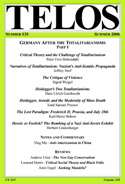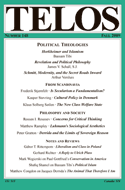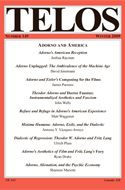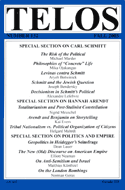By A. Staley Groves · Tuesday, March 9, 2010 This text was presented in January at the 2010 Telos Conference, “From Lifeworld to Biopolitics: Empire in the Age of Obama.”
President Obama was awarded the Nobel Peace Prize. Messianic peace was signified by the person conservatives and liberals labeled “messiah” or “the One.”[1] The Nobel committee symbolically demonstrated deliverance by promises of “change” and “hope.”[2] One week before the award another part of a media eschaton materialized: publicly contemplating a military coup to thwart the “Obama problem.” Appealing to U.S. military leaders in eight, compact bullet points, a well-credentialed journalist wrote: “Military intervention is what Obama’s exponentially accelerating agenda for ‘fundamental change’ toward a Marxist state is inviting upon America. A coup is not an ideal option, but Obama’s radical ideal is not acceptable or reversible.”[3] If right-wing American media, through its core of movement conservatism, announced Obama martyrdom, the Nobel Committee announced resurrection.
Continue reading →
By Andrew Walker · Tuesday, March 2, 2010 On Tuesdays at TELOSscope, we reach back into the archives and highlight an article whose critical insights continue to illuminate our thinking and challenge our assumptions. Today, Andrew Walker looks at Peter Uwe Hohendahl’s “Critical Theory and the Challenge of Totalitarianism,” from Telos 135 (Summer 2006).
 Totalitarianism is a curious phenomenon of modern history and is often said to be a very twentieth-century one, at least as far as developed liberal democracies are concerned. The archetype totalitarian states in Nazi Germany and Fascist Italy defined their political order against the established liberal democratic systems that existed elsewhere in Europe, and we saw them off. Further backslapping was called for when the Soviet Empire disintegrated and democracy was able to spread throughout Eastern Europe. But, as should be expected with conceptual discussions such as these, it is not as simple as it first appears. Critical Theory in the Frankfurt School tradition began to reach maturity in the context of a totalitarian Europe; the analyses of social structures and processes within modernity are shaped by the Fascist or Soviet state. But the categories of critique developed at this stage of Critical Theory are not anachronistic curiosities. The term “totalitarian” is a tricky one to define and apply. Peter Uwe Hohendahl’s article “Critical Theory and the Challenge of Totalitarianism” is both a historical discussion of the development, but also of the wider applicability, of ideas and theories surrounding totalitarianism. Totalitarianism is a curious phenomenon of modern history and is often said to be a very twentieth-century one, at least as far as developed liberal democracies are concerned. The archetype totalitarian states in Nazi Germany and Fascist Italy defined their political order against the established liberal democratic systems that existed elsewhere in Europe, and we saw them off. Further backslapping was called for when the Soviet Empire disintegrated and democracy was able to spread throughout Eastern Europe. But, as should be expected with conceptual discussions such as these, it is not as simple as it first appears. Critical Theory in the Frankfurt School tradition began to reach maturity in the context of a totalitarian Europe; the analyses of social structures and processes within modernity are shaped by the Fascist or Soviet state. But the categories of critique developed at this stage of Critical Theory are not anachronistic curiosities. The term “totalitarian” is a tricky one to define and apply. Peter Uwe Hohendahl’s article “Critical Theory and the Challenge of Totalitarianism” is both a historical discussion of the development, but also of the wider applicability, of ideas and theories surrounding totalitarianism.
Continue reading →
By Rolf Hugoson · Tuesday, February 23, 2010  The similarities between the five Nordic countries (Denmark, Finland, Iceland, Norway, and Sweden) have recently been manifested in their new Berlin embassies—five separate buildings and one common house, distributed around an open courtyard. The similarities between the five Nordic countries (Denmark, Finland, Iceland, Norway, and Sweden) have recently been manifested in their new Berlin embassies—five separate buildings and one common house, distributed around an open courtyard.
In English, the geographically more restricted term “Scandinavian” is often taken to be synonymous with “Nordic,” although the former geographical term actually excludes Finland and Iceland. I shall here use the term “Nordic,” even while focusing on a section in Telos 148 (Fall 2009) called “From Scandinavia.”
Continue reading →
By Nicole Burgoyne · Monday, February 22, 2010 Shannon Mariotti’s article “Damaged Life as Exuberant Vitality in America: Adorno, Alienation, and the Psychic Economy” appears in Telos 149 (Winter 2009): Adorno and America. Nicole Burgoyne follows up with some questions.
 Nicole Burgoyne: One of your main concerns with psychoanalysis as it developed in America in the postwar era is that it accepted a commercialized and materialistic view of happiness as an ideal. One can see how this sort of obsession with living life to the fullest is at odds with Freud’s early work toward curing suffering individuals and his later theories on the repressive nature of society in general. Do you see this uniquely American form of psychoanalysis, which Adorno characterizes as the loss of the individual experience, as related to his critique of America’s culture industry? Why are these phenomena prominent in American culture as opposed to elsewhere? Nicole Burgoyne: One of your main concerns with psychoanalysis as it developed in America in the postwar era is that it accepted a commercialized and materialistic view of happiness as an ideal. One can see how this sort of obsession with living life to the fullest is at odds with Freud’s early work toward curing suffering individuals and his later theories on the repressive nature of society in general. Do you see this uniquely American form of psychoanalysis, which Adorno characterizes as the loss of the individual experience, as related to his critique of America’s culture industry? Why are these phenomena prominent in American culture as opposed to elsewhere?
Continue reading →
By Neil Turnbull · Wednesday, February 17, 2010 This text was presented in January at the 2010 Telos Conference, “From Lifeworld to Biopolitics: Empire in the Age of Obama.”
Historians of the future will no doubt claim that the “neo-liberal era,” the era of neo-Smithean celebrations of “market naturalism,” was essentially the era of the “intellectual retreat of the political left.”[1] Although the story of this retreat is far too complex and contradictory to explore here, clearly one of the main reasons for the intellectual emaciation of “left politics” after the 1970s was the political right’s ideological appropriation of much of the left’s critical philosophical discourse. Perhaps most significant in this regard was the right’s re-articulation of Hegelian historico-political philosophical narratives into a version of nineteenth-century Whig progressivism; where the telos of western culture and society was conceived as nothing less than a new and final stage of capitalism founded on a triad of consumer culture, information technology, and finance. On the left, the loss of faith in orthodox Hegelian accounts of politics—and the loss of faith in orthodox Marxism is of course a case in point here—was to give rise to a new set of philosophical sensibilities, perhaps the most influential of which was the heterodox Hegelianism of so-called post-structuralist modes of social and cultural critique.
Continue reading →
By Philip Crone · Tuesday, February 16, 2010 Each Tuesday in the TELOSscope blog, we reach back into the archives and highlight an article whose critical insights continue to illuminate our thinking and challenge our assumptions. Today, Philip Crone looks at Aryeh Botwinick’s “Same/Other versus Friend/Enemy: Levinas contra Schmitt,” from Telos 132 (Fall 2005).
 Representative Joe Wilson’s outburst during President Obama’s speech to Congress on healthcare reform in some ways overshadowed the content of the speech itself. Had Wilson shouted out in another, non-American context, such as during the Prime Minister’s Question Time in the United Kingdom, he would have received little notice. But with an eye to the protocol and tradition surrounding presidential addresses to Congress in the United States, commentators from both the left and the right lambasted Wilson’s actions. Of course, Wilson was not without his supporters who seemed to have little concern for such protocols, or at least seemed to think that the gravity of the situation warranted violating the traditional standards. Still, Wilson’s yell stood in stark contrast to the lines offered at the end of Obama’s speech in which the President called for “[replacing] acrimony with civility.” Representative Joe Wilson’s outburst during President Obama’s speech to Congress on healthcare reform in some ways overshadowed the content of the speech itself. Had Wilson shouted out in another, non-American context, such as during the Prime Minister’s Question Time in the United Kingdom, he would have received little notice. But with an eye to the protocol and tradition surrounding presidential addresses to Congress in the United States, commentators from both the left and the right lambasted Wilson’s actions. Of course, Wilson was not without his supporters who seemed to have little concern for such protocols, or at least seemed to think that the gravity of the situation warranted violating the traditional standards. Still, Wilson’s yell stood in stark contrast to the lines offered at the end of Obama’s speech in which the President called for “[replacing] acrimony with civility.”
Continue reading →
|
|
 Totalitarianism is a curious phenomenon of modern history and is often said to be a very twentieth-century one, at least as far as developed liberal democracies are concerned. The archetype totalitarian states in Nazi Germany and Fascist Italy defined their political order against the established liberal democratic systems that existed elsewhere in Europe, and we saw them off. Further backslapping was called for when the Soviet Empire disintegrated and democracy was able to spread throughout Eastern Europe. But, as should be expected with conceptual discussions such as these, it is not as simple as it first appears. Critical Theory in the Frankfurt School tradition began to reach maturity in the context of a totalitarian Europe; the analyses of social structures and processes within modernity are shaped by the Fascist or Soviet state. But the categories of critique developed at this stage of Critical Theory are not anachronistic curiosities. The term “totalitarian” is a tricky one to define and apply. Peter Uwe Hohendahl’s article “Critical Theory and the Challenge of Totalitarianism” is both a historical discussion of the development, but also of the wider applicability, of ideas and theories surrounding totalitarianism.
Totalitarianism is a curious phenomenon of modern history and is often said to be a very twentieth-century one, at least as far as developed liberal democracies are concerned. The archetype totalitarian states in Nazi Germany and Fascist Italy defined their political order against the established liberal democratic systems that existed elsewhere in Europe, and we saw them off. Further backslapping was called for when the Soviet Empire disintegrated and democracy was able to spread throughout Eastern Europe. But, as should be expected with conceptual discussions such as these, it is not as simple as it first appears. Critical Theory in the Frankfurt School tradition began to reach maturity in the context of a totalitarian Europe; the analyses of social structures and processes within modernity are shaped by the Fascist or Soviet state. But the categories of critique developed at this stage of Critical Theory are not anachronistic curiosities. The term “totalitarian” is a tricky one to define and apply. Peter Uwe Hohendahl’s article “Critical Theory and the Challenge of Totalitarianism” is both a historical discussion of the development, but also of the wider applicability, of ideas and theories surrounding totalitarianism.  The similarities between the five Nordic countries (Denmark, Finland, Iceland, Norway, and Sweden) have recently been manifested in
The similarities between the five Nordic countries (Denmark, Finland, Iceland, Norway, and Sweden) have recently been manifested in  Nicole Burgoyne: One of your main concerns with psychoanalysis as it developed in America in the postwar era is that it accepted a commercialized and materialistic view of happiness as an ideal. One can see how this sort of obsession with living life to the fullest is at odds with Freud’s early work toward curing suffering individuals and his later theories on the repressive nature of society in general. Do you see this uniquely American form of psychoanalysis, which Adorno characterizes as the loss of the individual experience, as related to his critique of America’s culture industry? Why are these phenomena prominent in American culture as opposed to elsewhere?
Nicole Burgoyne: One of your main concerns with psychoanalysis as it developed in America in the postwar era is that it accepted a commercialized and materialistic view of happiness as an ideal. One can see how this sort of obsession with living life to the fullest is at odds with Freud’s early work toward curing suffering individuals and his later theories on the repressive nature of society in general. Do you see this uniquely American form of psychoanalysis, which Adorno characterizes as the loss of the individual experience, as related to his critique of America’s culture industry? Why are these phenomena prominent in American culture as opposed to elsewhere?  Representative Joe Wilson’s outburst during President Obama’s speech to Congress on healthcare reform in some ways overshadowed the content of the speech itself. Had Wilson shouted out in another, non-American context, such as during the Prime Minister’s Question Time in the United Kingdom, he would have received little notice. But with an eye to the protocol and tradition surrounding presidential addresses to Congress in the United States, commentators from both the left and the right lambasted Wilson’s actions. Of course, Wilson was not without his supporters who seemed to have little concern for such protocols, or at least seemed to think that the gravity of the situation warranted violating the traditional standards. Still, Wilson’s yell stood in stark contrast to the lines offered at the end of Obama’s speech in which the President called for “[replacing] acrimony with civility.”
Representative Joe Wilson’s outburst during President Obama’s speech to Congress on healthcare reform in some ways overshadowed the content of the speech itself. Had Wilson shouted out in another, non-American context, such as during the Prime Minister’s Question Time in the United Kingdom, he would have received little notice. But with an eye to the protocol and tradition surrounding presidential addresses to Congress in the United States, commentators from both the left and the right lambasted Wilson’s actions. Of course, Wilson was not without his supporters who seemed to have little concern for such protocols, or at least seemed to think that the gravity of the situation warranted violating the traditional standards. Still, Wilson’s yell stood in stark contrast to the lines offered at the end of Obama’s speech in which the President called for “[replacing] acrimony with civility.” 

